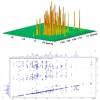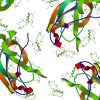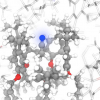Oxford University published the first scientific evidence for a potential diagnostic based on metabolomic analysis of MS patient samples by using nuclear magnetic resonance (NMR) technology, and has long-standing expertise in MS research. The disease’s transitions “relapsing remitting multiple sclerosis (RRMS)” and “secondary progressive multiple sclerosis (SPMS)” can currently only be diagnosed retrospectively. A diagnostic test that reliably identifies the emerging transition from RRMS to SPMS by detecting their different biomarker networks would improve the therapy concepts of MS patients.
Oxford is collaborating with numares to exploit the diagnostics potential of this NMR approach and transform it into a commercially available IVD product. numares has developed its NMR-based AXINON® IVD system that evaluates NMR spectra to diagnose disease by employing the company’s proprietary MGS technology to ensure standardisation and comparability of the spectra across patient samples and NMR systems. These basic prerequisites of the system provide the basis for collaborations between research institutions and industry to successfully apply metabolomics to human diagnostics.
Professor Daniel Anthony, Head of Experimental Neuropathology Laboratory, Department of Pharmacology at the University of Oxford and lead scientist on the project, said: “This collaboration benefits our laboratory and Oxford in several ways. First, the MGS-based AXINON IVD system will enable us to accelerate our research due to numares’ software-based profiling system. Second, results of the research may be directly applicable for the development of an MS IVD that could identify patients with progressing disease and help to adopt an appropriate treatment plan. Third, the university will be able to bring its application-oriented research to the patient thanks to numares’ technical and financial assistance and to participate in future royalties from a commercialised test. We are looking forward to a very productive collaboration with numares.”
Volker Pfahlert, Chief Executive Officer of numares, added: “Our mission is to improve patient care by providing better diagnostic tools to help physicians better manage their patients. A central part of our effort is to collaborate with researchers at academic centres to deploy our system to assist them in their work to both understand human disease and to further expand our product pipeline by developing diagnostics based on that preliminary scientific work. We are truly proud and honoured that Oxford provided us the opportunity to collaborate on this research. We are looking forward to the results of this work.”











